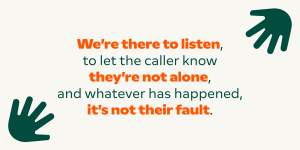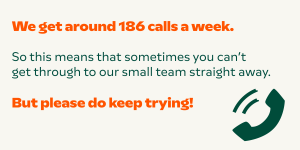What do the CMS changes mean for me?
26th Jun 2025
Read more
Posted 4 September 2024
 Gingerbread regularly hears from single parents who have experienced abuse or a traumatic relationship breakdown. Our advice service manager, Jack Gillis, explains what support we can offer, and why reaching out for help is so important.
Gingerbread regularly hears from single parents who have experienced abuse or a traumatic relationship breakdown. Our advice service manager, Jack Gillis, explains what support we can offer, and why reaching out for help is so important.
‘The first thing I’d say to anyone in a situation like Emma’s, is to reassure them they’ve done the right thing in speaking out. It’s very hard to talk about abuse, whether that’s sexual, physical or coercive control. When we take calls like this on Gingerbread’s advice line, the most important thing we can do is to give the person time and space to talk.
We’re there to listen, to let the caller know they’re not alone, and whatever has happened, it’s not their fault.

Obviously, our immediate priority after that is to make sure that the person calling – and everyone around them – is physically safe. We’d ask questions to make sure they’re not in any immediate danger or at risk of further harm or abuse. We’d also look at their mental wellbeing, how they’re coping. And we’d signpost to other services who could give them more support – whether that’s local health services, counselling or specialist domestic abuse support.
When you call the Gingerbread advice line, you’ll talk to one of our team of dedicated single parent advisors. There’s 7 of us – we’ve all worked in advice roles for most of our careers, and some of us have been with Gingerbread for 10 years or more. There are other helplines out there – but what’s unique about Gingerbread is that we take a holistic look at everything that’s going on in a single parent’s life. We can look at benefits, work, finances and housing, and any other aspect of single-parent family life. And if we don’t know the answer, we can usually signpost to someone who does.

We get around 186 calls a week. So this means that sometimes you can’t get through to our small team straight away. But please do keep trying!
We don’t offer a ‘casework’ service. In other words, if you call more than once you won’t necessarily speak to the same person. We find this works well for single parents. People often give us an initial call when they’re just ‘scanning the horizon’ – checking out what options are out there. And then they might call us again a bit further down the line, for more detailed information.
It’s the same team, providing the same service, whether you use the webchat or call the advice line. It’s good to have both options. Sometimes people aren’t able to talk out loud, if they’re calling from work or if they’re looking after their children. The only thing we can’t do via the webchat is to give complex benefits advice. That’s because we have to ask so many questions about the individual’s circumstances, which would take too long by webchat.
The family courts and child contact arrangements are subjects that come up quite often in calls. We don’t give professional legal advice – but we can point people in the right direction if they need it. And we can explain how the family courts and other systems work, so that people know what to expect.
In the vast majority of families, it’s best for children to have contact with both parents. In a situation like Emma’s, where child abuse has been involved, I think we’d all agree, morally, that the child’s safety has to take priority. But other cases aren’t always as clear cut, and this can be where the family courts play a role. They can take a balanced, independent view of what’s in the best interests of the child, not just what’s easiest or most convenient for either parent.
Going through the family court isn’t a quick process. It can take from 6 months to a number of years, depending on the case. We’d suggest that anyone considering this route gets professional legal advice. Legal aid has been cut so fewer people are entitled to it now – but if you’re on a low income, have savings below a certain level and if you’ve experienced abuse, it’s worth checking if you’re entitled.
Some of the calls we receive aren’t from the single parent themselves. We often get calls from people calling on behalf their grown-up child. When someone’s coming out of an abusive relationship, or any kind of traumatic experience, family can play a vital role in supporting them. First and foremost, it’s about providing a reassuring presence, and helping to keep family life as normal as possible. But someone who’s calm and less distressed is also better placed to speak to our advice line, gather all the information and help the single parent weigh up their options.
It’s fine to call us on behalf of a family member if they’re not ready to speak to us themselves.
Above all, we’d want to say to anyone who might have had similar experiences to Emma – help is out there and you’re not alone. It can seem insurmountable, but the old saying about taking it one day at a time is good advice. Just focus on taking the next step, and as much as you can, stick to your normal family routines – this can help you feel more in control. There are lot of sources of help and advice out there, and Gingerbread’s advice team can help you work out your options.’
We’re honoured that Emma’s decided to share her story with us, and we hope her courage will show other people that it’s ok to reach out for help. As Emma says, ‘there’s always a rainbow’, and even the darkest situations can get better.
If you’ve been affected by any experiences like Emma’s, please reach out to the Gingerbread advice line for support. The following websites may also be helpful: